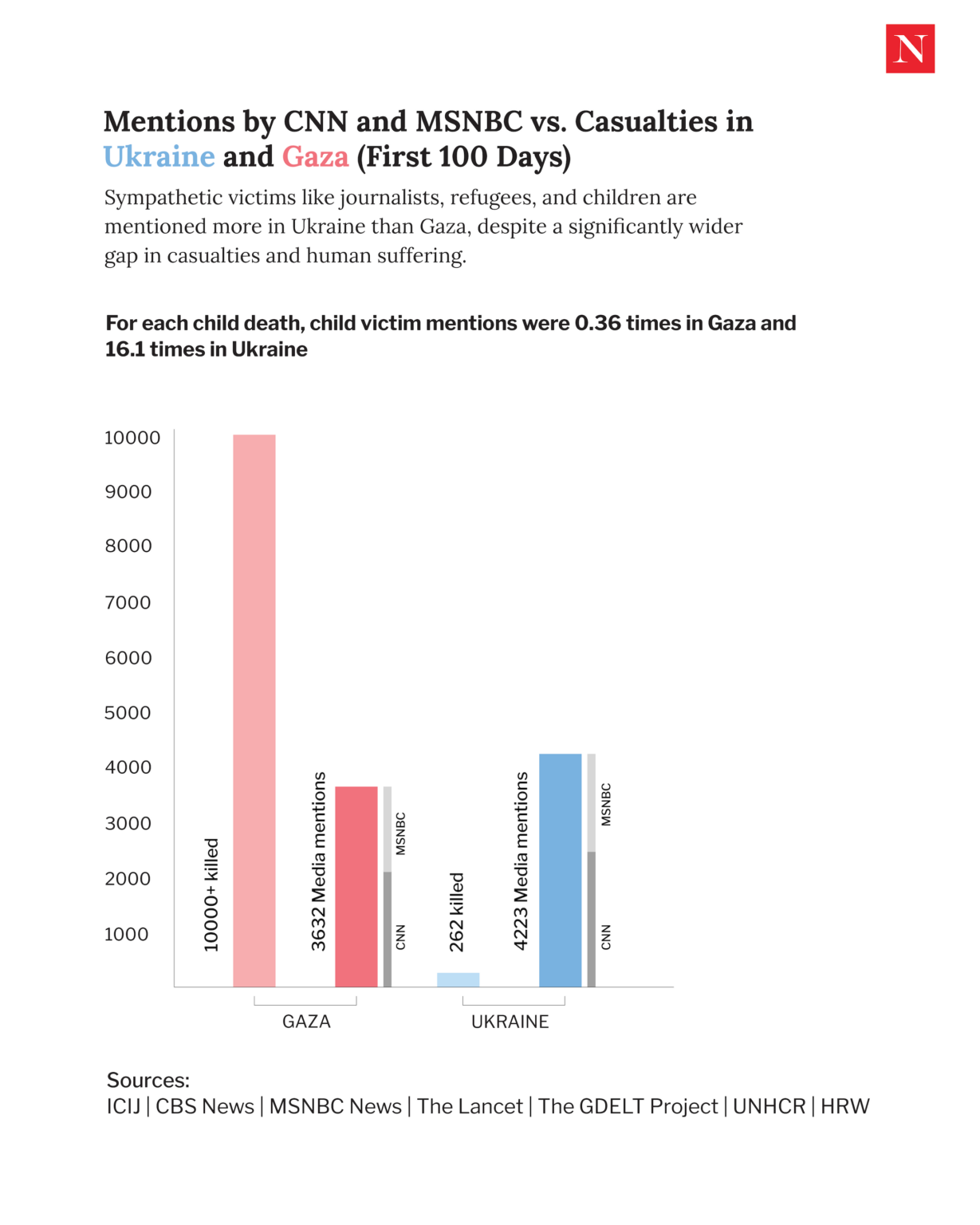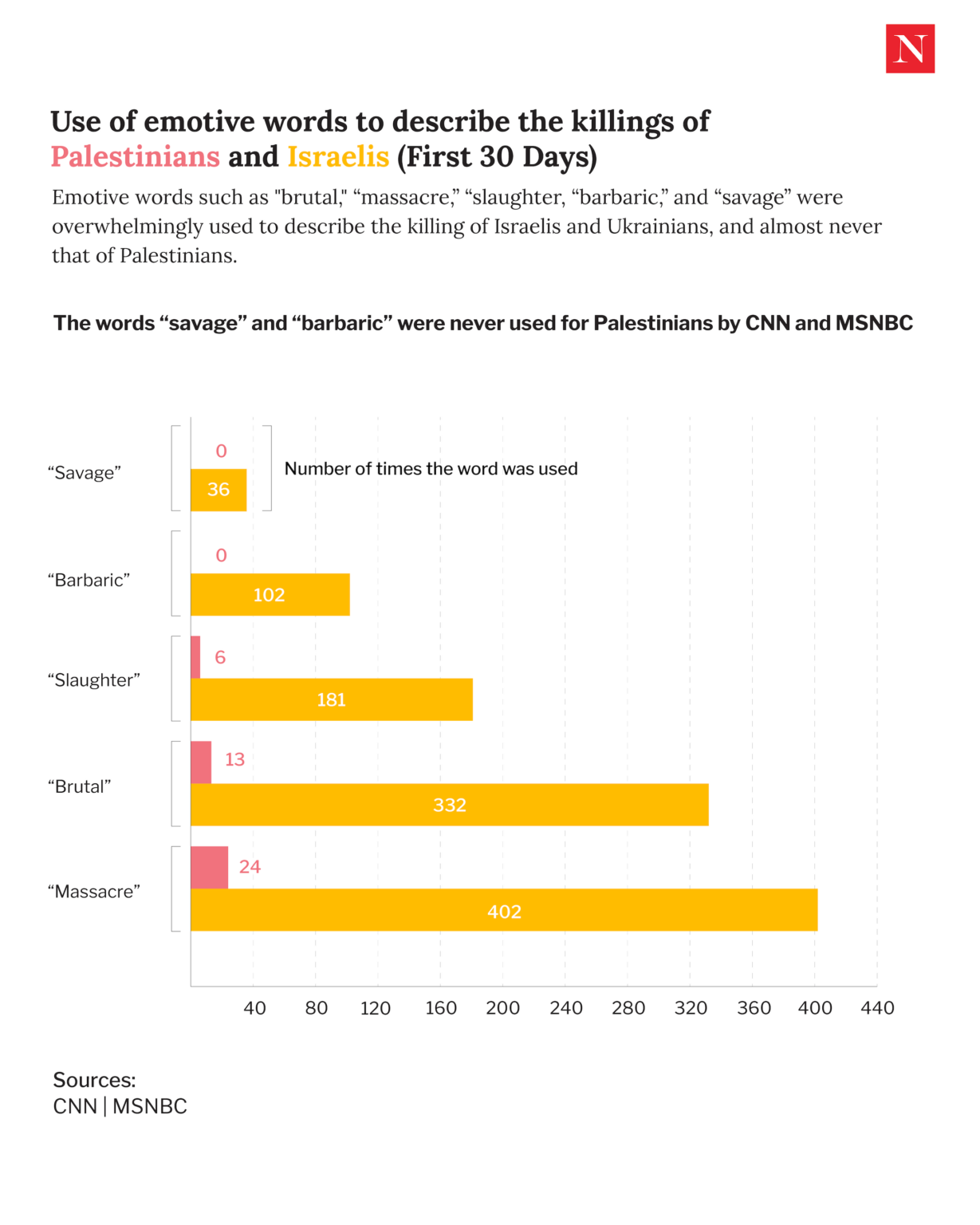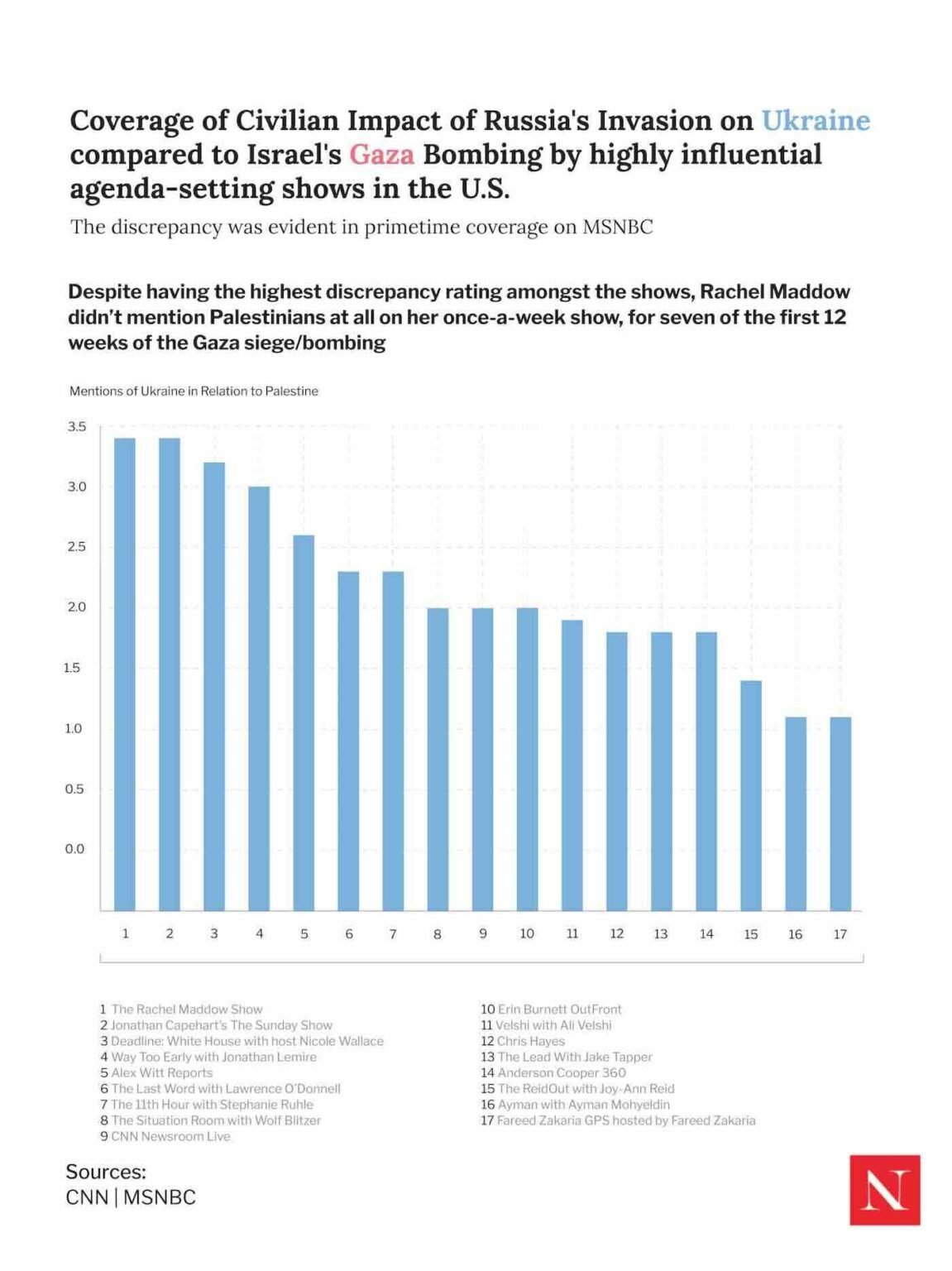CNN and MSNBC’s first 100 days of reporting on Israel’s war on Gaza showed a consistent double standard in its coverage, with Palestinians receiving far less sympathetic and humanizing coverage than either Israelis during the same period or Ukrainians during the first 100 days after Russia’s invasion, a Nation analysis of major media coverage has found.
Finding 1:
Sympathetic victims like journalists, refugees, and children are mentioned more in Ukraine than in Gaza, despite a significantly wider gap in casualties and human suffering.

Finding 2:
On CNN and MSNBC, emotive words such as “brutal,” “massacre,” “slaughter, “barbaric,” and “savage” were overwhelmingly used to describe the killing of Israelis and Ukrainians, and almost never used to describe the killing of Palestinians.

Finding 3:
CNN and MSNBC covered the impact of Russia’s invasion on civilians twice as often as they did the impact of Israel’s bombing and siege of Gaza on civilians, despite the latter having a death toll five times that of the former.

I wonder how much of this bias is even conscious on their part. They’ve grown up in a country where leaders on both the left and the right constantly talk about both how Israel is a necessary ally and being told to constantly worry about terrorism.
I’m not justifying it by any means. They should be looking into their unconscious biases. I’m just interested to know.
Totally agreed, however in the context of news, it is a deliberate editorial choice. Money speaks through the editorial boards of these corporate news organizations.
Plus the massacre that started everything was so horrific, it made a clear good guy - bad guy effect in the immediate aftermath. Same as Russia looking like the bad guys invading Ukraine, especially with Zelensky being a charismatic good guy.
Those of us watching from a far, seeing it only on our screens, try to categorize what we see. And decide who we align with.
The problem is that Israel is complicated on a good day, most of us don’t have anywhere close to basic understanding of what’s going on politically there. Then add in the weird religious stuff. (For instance, my dad thinks Israel is ordained by God and therefore the government there is not corrupt, but also thinks Jewish people should convert to Christianity?)
So people feel like they can’t criticize Israel (because God) and also can’t comprehend that bad things are being done by the “good guys” to innocent people. And the innocent people are also of yet another religion that they’ve been taught to fear- so…
And politicians and journalists are also stuck because if they are too critical of Israel, it fuels antisemitism, at least here in the US.
I don’t have a solution, other than for someone smarter than me to figure out how to explain it in simple terms, that can be fed in short segments to the population along with the on the ground reporting. But that would still have to compete with the dissonance in messaging coming from churches.
Plus the massacre that started everything was so horrific,
The nakba?
I wonder how much of this bias is even conscious on their part.
They are groups of individuals at various stages on their corporate ladders, some of them are very aware but they do what their management tells them or get another job.
Left and right? Liberals are not leftists. They’re both right wing parties.
Thanks for missing the point.
News media is highly produced. I’d have a harder time believing these words aren’t being carefully chosen for their impact.
I can’t speak for the national level, but I’ve worked in local news media and no it isn’t, it’s a shit show.
Right–everyone in the world is just winging it. Some of them are winging it in ways that create dead children.
I mean I don’t know if they are winging it higher up and we never dealt with this sort of subject since it was local news. For all I know, it was designed to be this way on that level.
All I can say was at the level where I was, it was absolute chaos all the time and the producers basically spent most of their time on the phone trying to find something to fill that noontime half hour and then frantically writing the script.
My eyes and ears revealed the double standard, for it was glaring.
The Nation - News Source Context (Click to view Full Report)
Information for The Nation:
MBFC: Left - Credibility: High - Factual Reporting: High - United States of America
Wikipedia about this sourceSearch topics on Ground.News
https://www.thenation.com/article/society/cnn-msnbc-gaza-media-bias-study/
I get why they’re doing this data, but Ukraine and Gaza are not remotely equiviqual and drawing these types of comparisons can serve to undermine Ukrainian support.
The full article states
We do not do this to imply that Ukrainians were somehow unworthy of the compassionate coverage they received. But highlighting biases in US media is impossible without having a point of reference, and given the closeness in time and the total inversion of the geopolitical dynamics, the coverage of Ukraine is a useful way of showing that American media can, indeed, be broadly sympathetic when it chooses to be. The point of this analysis is not that US media should reduce its coverage of the tragedies in Ukraine to achieve parity with Gaza, but that it should elevate its coverage of the suffering in Gaza to be comparable to that of Ukraine, with the same urgent and moralizing tone.
CNN and MSNBC’s pointed lack of sympathy with Palestinians is also important to examine because the media’s consistent dehumanization and erasure of their suffering has helped 12 months of a killing campaign, backed by unending American military and political support, that is unprecedented in the 21st century, according to Oxfam International. Israel’s operations have been characterized by a level of brutality that is difficult to capture with statistics, but here are two examples: As of January, Save the Children was reporting that an average of 10 children a day in Gaza were losing one or both of their legs per day, and in April, UN Women estimated that 19,000 children had been orphaned.
It’s an old form of analysis to compare media coverage of official state allies versus enemies. I think Chomsky is most famous for using/developing it.




